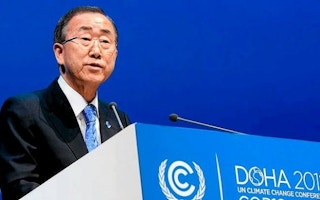Doha, Qatar – United Nations Secretary General Ban Ki-moon on Tuesday urged governments to make progress, warning that climate inaction threatens world economy, security of all nations and that of the future generation.
“Let us be under no illusion. This is a crisis. A threat to us all. Our economies, our security and the well-being of our children and those who will come after,” the UN chief said at the high level segment of the 12-day talks under the UN Framework Convention on Climate Change (UNFCCC).
Government negotiators and ministers from 194 countries at the climate talks will try to hammer out a global agreement under the 1997 Kyoto Protocol, whose first commitment period expires in by end of this year.
Under the Protocol, 37 nations consisting of highly industrialized countries and emerging economies, have legally binding commitments to limit and reduce their greenhouse gas emissions by an average of 5.2 percent below 1990 levels from 2008 to 2012.
“We, collectively are the problem. Then we should have the solutions. Greenhouse gas emissions are the highest they have ever been. We are in a race against time to stay below the agreed threshold of 2 degrees above pre-industrial levels that will avoid the worst impacts of climate change,” the UN chief said. “Every delay means greater future effort or greater future harm.”
Mr Ban cited recent reports from the United Nations and World Bank on the growing danger of climate inaction such as melting icecaps, rising sea levels, flooding and drought in all parts of the world.
“Acting now makes better economic sense than allowing further delay. That is why it is imperative that we act now, with urgency and with clear purpose, both in these negotiations and in our countries, our cities, our businesses, our homes,” he stated.
The UN chief said in a speech at the talks that aside from the adoption of a second commitment period of the Kyoto Protocol, progress must be made on long-term climate finance to support mitigation and adaptation by developing countries.
At last year’s climate change talks in Durban, South Africa, developed countries pledged US$30 billion between 2010 and 2012. By 2020, rich nations are supposed togenerate US$100 billion annually to help poor nations cope and adapt to the changing climate through the Green Climate Fund.
“If we act together with clear purpose, we can meet this challenge. But we need to be united. Governments from all regions, business and civil society. We have a clear choice, to stand together or fall together,” Mr Ban said.

















